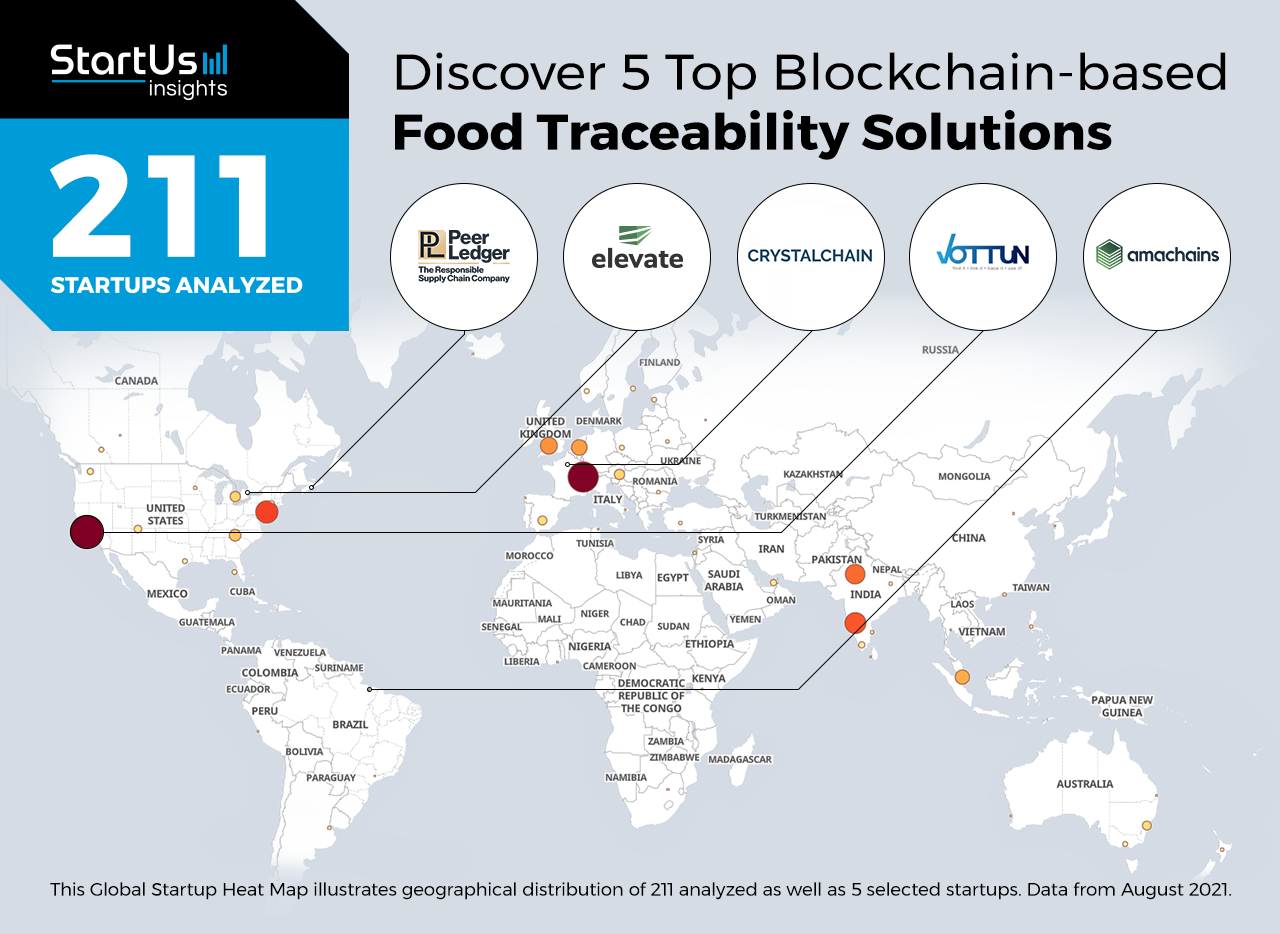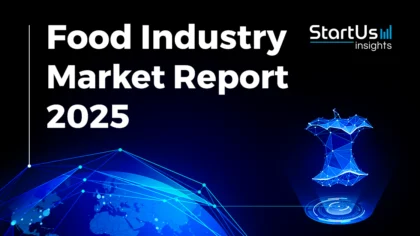Staying ahead of the technology curve means strengthening your competitive advantage. That is why we give you data-driven innovation insights into the food industry. This time, you get to discover 5 hand-picked blockchain-based food traceability solutions.
Global Startup Heat Map highlights 5 Top Blockchain-based Food Traceability Solutions out of 211
The insights of this data-driven analysis are derived from the Big Data & Artificial Intelligence-powered StartUs Insights Discovery Platform, covering 2.093.000+ startups & scaleups globally. The platform gives you an exhaustive overview of emerging technologies & relevant startups within a specific field in just a few clicks.
The Global Startup Heat Map below reveals the distribution of the 211 exemplary startups & scaleups we analyzed for this research. Further, it highlights 5 FoodTech startups that we hand-picked based on criteria such as founding year, location, funding raised, and more. You get to explore the solutions of these 5 startups & scaleups in this report. For insights on the other 206 blockchain-based food traceability solutions, get in touch.
VOTTUN enables Traceable Supply Chains
The food supply chains are large and fragmented. Unreliable information on the source and storage condition of food presents a health risk to consumers. Blockchain technology allows insights into traceable food supply chains through data on the origin and processing of food. This process empowers data-driven decision-making. Thus, startups develop solutions that improve the traceability of food products.
US-based startup VOTTUN provides blockchain-based traceability solutions. The startup’s platform enables collaboration with suppliers across the supply chain and offers transparency to third parties such as customers and authorities. Furthermore, the solution improves internal control, which allows food companies to ensure security and compliance. The startup provides traceability for precious metals and industry as well.
Elevate Farms develops Traceable Vertical Farms
Due to land and water constraints, vertical farms are a necessity to feed the growing population. They allow for large-scale urban farming, utilizing land typically inaccessible to agriculture. Additionally, setting up vertical farms enable innovative implementation of new technologies, such as blockchain, robotics, and AI. Thus, startups develop blockchain solutions for vertical farms, providing information from seed to sale.
Canadian startup Elevate Farms creates blockchain-tracked vertical farms. The startup grows local, sustainable, zero-pesticides vegetables and uses blockchain to track them from seed to sale. The startup combines proprietary LED light technology, photobiology, and robotic automation to grow crops. Its solution enables highly efficient farming while reducing land and water use.
Crystalchain provides End-to-End Traceability
Traceability works on two ends, the producer and the consumer. The former allows the supply chain to remain authentic and accountable. The latter is the value consumers get from transparent information. End-to-end traceability solutions optimize both ends to create connected marketplaces. For this, startups combine blockchain and interactive technologies.
French startup Crystalchain offers end-to-end traceability via three product systems. The first product is a customer interface with a quick response (QR) code that allows customers to learn crucial information about products better. The second product is a distributor platform that caters to quality managers and enables the tracing of the entire value chain. Managers gain a better understanding and control of the supply chain. The third integrates the first two services, providing customer engagement and analysis of the supply chain.
Amachains offers Smallholder Traceability
For independent smallholder farmers, traceability is difficult to implement. This is due to the capital expenditure associated with enabling traceability. However, consumers require transparent information about the source of their foods. To make traceability affordable, startups develop accessible blockchain technologies to empower all farmers.
Brazilian startup Amachains offers smallholder traceability solutions for agro-ecological farmers. The startup develops a traceability system that uses blockchain and compliance and applies to any production chain. The tool is available free of charge to all end consumers and also to producers of family farming. These producers must have an active and regularized DAP (Declaração de Aptidão ao Pronaf) in Brazil and equivalent registration in other countries. The startup utilizes its technology to help in achieving the 17 UN Sustainable Development Goals.
Peer Ledger advances Internet of Things (IoT)-based Traceability
Sensors and actuators allow for data into the entire supply chain, beginning from raw material acquisition to final product sale. These IoT devices help in tracing food products and providing information to end-users. In addition to this, integrating IoT data into a blockchain system ensures that the information is trustless and untampered. Thus, startups provide IoT and blockchain solutions to increase overall traceability across the food supply chain.
US-based startup Peer Ledger provides IoT-based traceability solutions that enable traceable, transparent food products. MIMOSI Connect is a traceability platform that uses IoT to map scope 3 greenhouse gas (GHG) emissions and enables geofencing. This helps reduce recall risk and cost, building better customer relationships. The startup complies with and delivers digital transmission of digital food supply chain data. The startup offers traceability to other industries such as mineral mining and apparel. Besides this, the startup offers a COVID-19 testing and vaccination platform.
Discover more FoodTech Startups
Food startups such as the examples highlighted in this report focus on digital food management, quality management, as well as sustainable sourcing. While all of these technologies play a major role in advancing the food industry, they only represent the tip of the iceberg. To explore more food technologies, simply get in touch to let us look into your areas of interest. For a more general overview, you can download our free FoodTech Innovation Report to save your time and improve strategic decision-making.


![Food and Beverage Industry: Top 10 Technology Trends [2025 & Beyond]](https://www.startus-insights.com/wp-content/uploads/2024/11/Food-and-Beverage-Industry-Trends-SharedImg-StartUs-Insights-noresize-420x236.webp)






